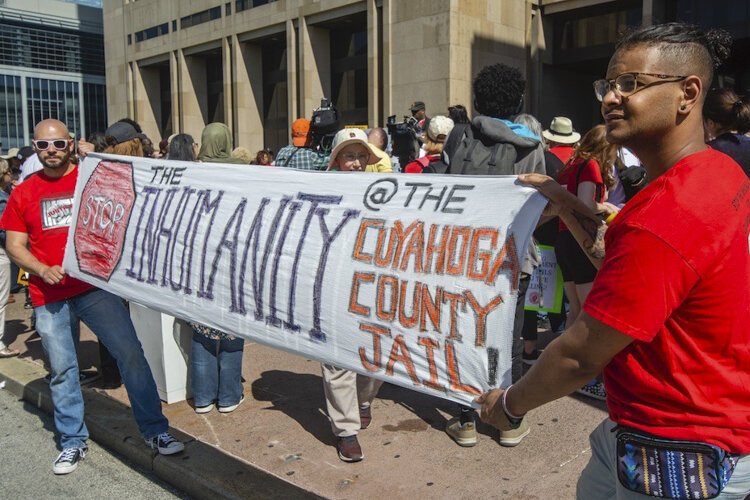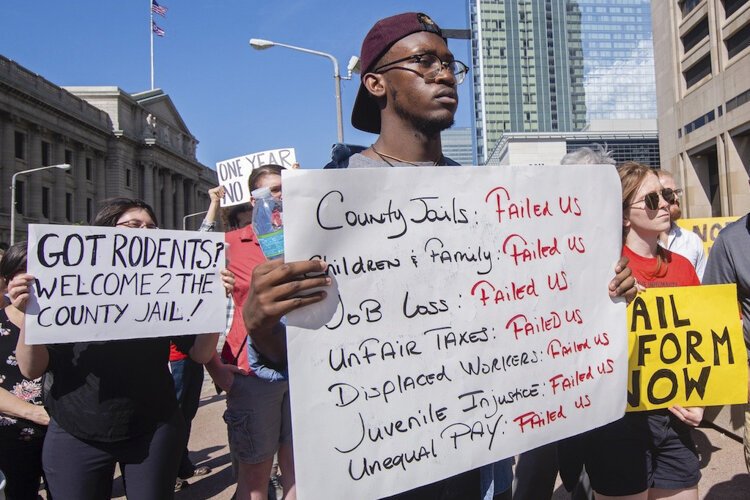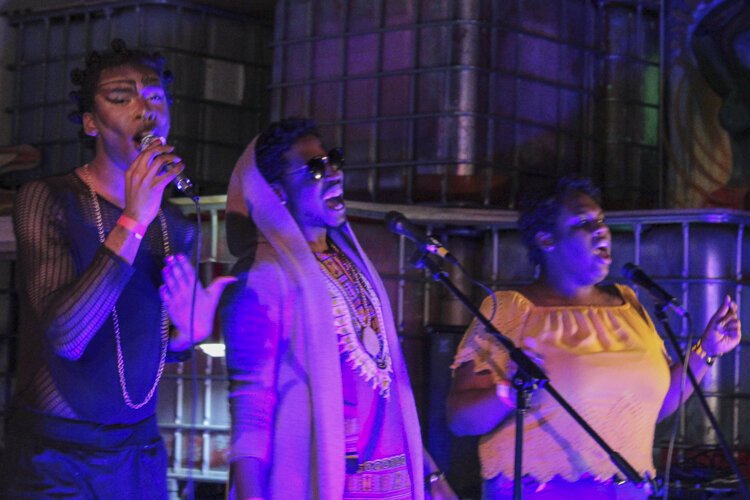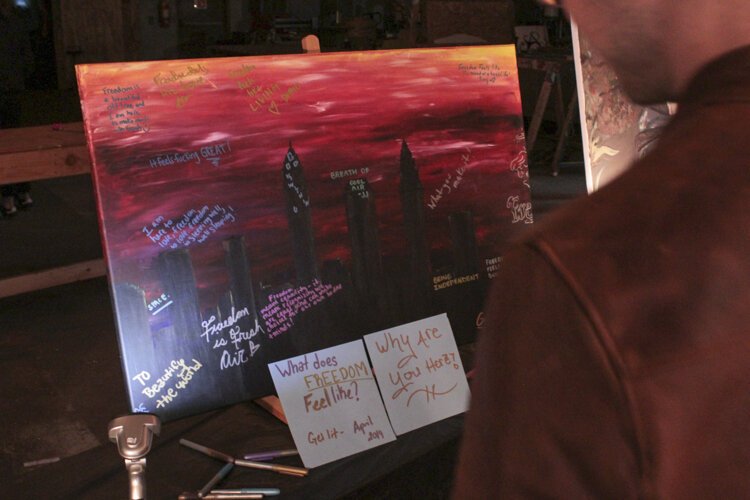Meet the changemakers ready to rally for justice at the Cuyahoga County Jail
Devin* is no stranger to adverse circumstances. The 24-year-old’s background includes military training, specifically the completion of ECAC training: Evasion and Conduct after Capture (a multi-day, hardcore immersion program that trains service members to survive high-risk environments that may place them at increased risk of isolation).
That extreme experience was nothing compared to the week he spent in the Cuyahoga County Jail.
“There were things happening there that should not be allowed to happen under any circumstance,” Devin quietly recalls.
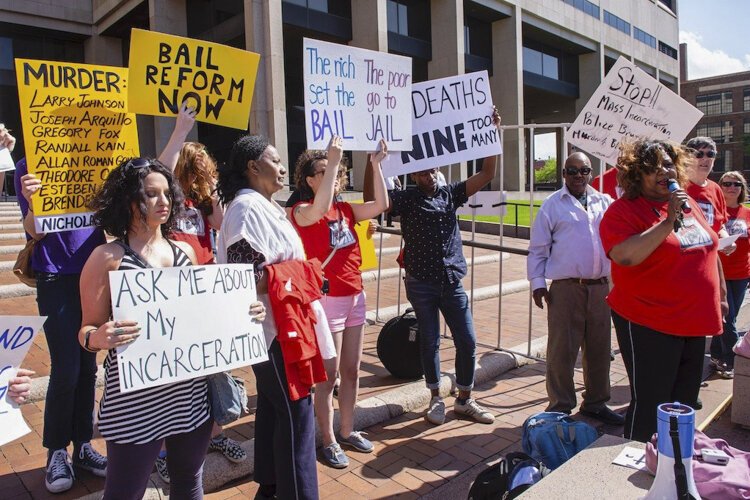 Coalition to Stop the Inhumanity action at the county jail in MayIn December 2018, Devin hosted a dinner party in Cleveland Heights. One of his guests became too intoxicated, then got rowdy and aggressive. In the process of kicking him out, Devin got into a physical altercation with his guest and was later charged with damages. After a short stay in the Cleveland Heights City Jail, Devin was transferred to the Cuyahoga County Jail.
Coalition to Stop the Inhumanity action at the county jail in MayIn December 2018, Devin hosted a dinner party in Cleveland Heights. One of his guests became too intoxicated, then got rowdy and aggressive. In the process of kicking him out, Devin got into a physical altercation with his guest and was later charged with damages. After a short stay in the Cleveland Heights City Jail, Devin was transferred to the Cuyahoga County Jail.
“There wasn’t any notification of my transfer,” Devin says. “It took over 12 hours for my family to find out where I was.”
The conditions Devin encountered were straight out of a dystopian landscape: a community-type pod with over 50 people in an area that couldn’t accommodate half that amount. Bunk beds lined the perimeter, with sleeping mats on any parcel of floor that could fit a body. Only four toilets and four showers were available for the huddled masses, and toilet paper was heavily rationed in the rare instances that it was available at all. (Devin says he avoided using the bathroom for lack of toilet paper.)
He describes a combative relationship between the Corrections Officers (COs) and the inmates, a constant source of palpable tension. When one CO mispronounced Devin’s last name, Devin corrected him. Devin described what followed as humiliating and dehumanizing.
“He told me to shut the f*ck up and referred to me by my inmate number for the rest of my time there,” says Devin. “I don’t think the COs are trained or feel comfortable and confident, acting primal and aggressive instead of trying to understand how people work and the situation that they are in.”
On top of the overcrowded and unsanitary conditions, Devin’s own mental health was placed at risk. He developed PTSD from his time in military service, for which he takes 100 mg of Zoloft to navigate his anxiety. When he told his COs that he needed his meds, they told him he had to go through a medical screening. It took two days to get a screening, and still he was not given his medication.
“I never got the Zoloft,” says Devin. “I was really depressed and sunk back into pre-therapy behaviors.”
And yet, as bad as the conditions were in the Cuyahoga County Jail, Devin is alive to tell his story. Others have not been so fortunate. In response to seven deaths—three of them from suicide—and 55 suicide attempts by detainees in the Cuyahoga County Jail in 2018, the U.S. Marshals released a report in November that painted a fuller picture of an environment with conditions more like a gulag than a Midwest jail in a blue county.
The report’s findings included:
- Denial of basic hygiene, including cells that were not equipped with functioning toilets or running water. Inspection of the lockdown “Red Zone” revealed the absence of toothbrushes, toothpaste, and toilet paper.
- Food used as a punitive measure, and, even when served, lacking in basic daily nutritional requirements. Additionally, many meals were not refrigerated or were stored in unused office areas that reeked of dead vermin.
- A medical program deemed “inadequate,” unable to provide sufficient or clear answers to six of the inmate deaths.
On June 6, Ohio Governor Mike DeWine announced he would be instituting changes to the state inspection process for local jails, specifically targeting the Cuyahoga County Jail. If the issues are not addressed, DeWine plans to file a lawsuit against the county to ensure compliance with jail standards. The following week, Cuyahoga County Executive Armond Budish issued a statement saying that the county welcomes “the opportunity to work with the State to continuously improve conditions at the jail.”
As words and promises get bandied back and forth—a new jail administrator is now on the job and a fresh contract with MetroHealth has been signed to take over healthcare in the jail—inhumane conditions persist. In response, a coalition of 17 Cleveland organizations is bringing much-needed volume to a shocking situation rife with abuse and neglect, yet still inexplicably cloaked in silence.
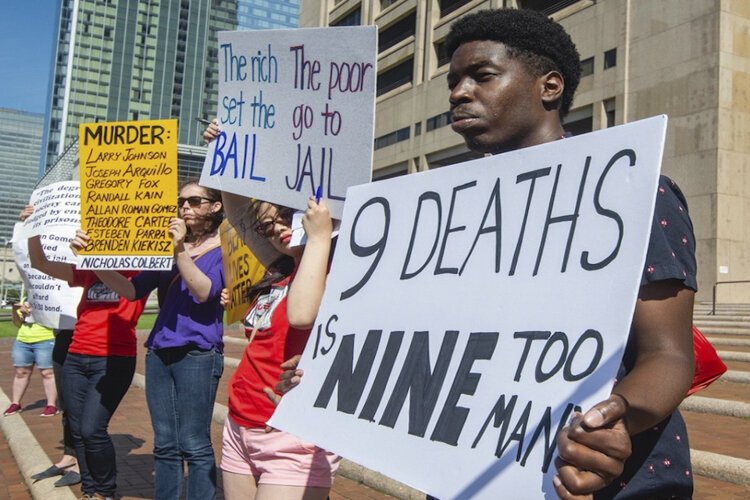
Coming together
“It started with a conversation,” recalls Kareem Henton, lead organizer and founding member of Black Lives Matter Cleveland.
Following the U.S. Marshals report in November, Cleveland-based activist Keith Wilson called up Henton to strategize what could be done to improve the horrendous conditions in the jail. From that phone call, the Coalition to Stop the Inhumanity at the Cuyahoga County Jail began to take shape, with the goal of raising awareness and demanding transparency.
Along with collecting signatures for petitions and holding protests, coalition members make strategic public statements and attend Cuyahoga County Council meetings.
They've also devised and implemented methods that could directly help address jail overcrowding—specifically with regards to bail reform and court reminders. At one point, the space with a capacity for 1,700 inmates was overflowing with 2,600 people (a majority of whom hadn’t been convicted of a crime, but were either waiting to make bail or for their court appearance).
Henton shares that over 75 percent of people in jail are incarcerated for minor infractions, but their inability to pay their bail amount directly contributes to overcrowding. Working with The Bail Project, efforts were introduced to assist inmates to pay to what often amounts to a few hundred dollars, and then help remind them of upcoming important court dates.
“When you do something as simple as provide court reminders, over 90 percent come back to complete the entire process,” says Henton. “It’s all about doing what we can do to make sure people do not end up back in jail.”
Harnessing the power of youth
A core strategy for the Coalition has been to enlist a diverse array of voices to keep pressure and visibility on improving conditions in the jail. The Ohio Student Association (OSA) has proven to be a key partner in these efforts. Created in 2012, OSA organizes young people to build independent political power via nonviolent direct action, advocacy, and leadership development. The interest in working on jail reform did not need to be created—the passion was already there.
“Our members worked so hard on Issue 1 [the Drug and Criminal Justice Policies Initiative] and, in a lot of ways, jail reform is a continuation of that work,” says Rachael Collyer, Civic Engagement Manager for OSA.
True to their grassroots organizing nature, OSA co-hosted “Get Lit for Liberation” in April, a collaborative fundraising event that shed light on the injustices at the jail via live music and visual art. Collyer cites the event as just one of the many creative ways young people can be engaged to channel the energy for social change inherent in this generation.
“Many people in our organization have been touched by the criminal justice system,” says Collyer. “They want to be involved in action but aren’t sure how they can help. So we go to them and help them bring their full talents to this work so that they can do things on a local level and have an impact that they can actually see.”
Health matters
Yvonka Hall wants to make sure everybody knows that the conditions in the Cuyahoga County Jail are a health emergency. As the Executive Director of the Northeast Ohio Black Health Coalition and Outreach Director for the Cuyahoga County Progressive Caucus, Hall joined the coalition to apply the knowledge she has amassed through her considerable advocacy work. She highlights the great power of individuals who have been inside the jail to share their personal narratives.
“I spoke to one young man who said he worked in the jail’s kitchen and he went on to say that he didn’t have any soap or toilet paper,” recalls Hall. “I sat there and thought, ‘What the hell?’ We are subjecting people to the most inhumane conditions, and we’re doing so in this supposed Democratic stronghold.”
But along with the stories being shared, Hall highlights that people need to actually stop and listen so that the full impact of these ghastly conditions can be understood. She reminds us that these are issues not just of physical sanitation, but also of mental health.
“If you didn’t have a mental health issue going into that jail, you will surely have one coming out,” says Hall. “Close your eyes and imagine that you were put in a place where you were abused and denied toilet paper and soap because you were poor—this will have long-term mental health effects. This situation should be unacceptable to anyone.”
The status quo certainly isn’t acceptable to Devin, who is still trying to wrap his mind around his week in jail half a year ago. Even after his family paid his bail money, it still took over 12 hours for him to be released. It was an additional half-day in a hellish environment for which even his military training didn’t prepare him.
“The military taught me to stay quiet, get through every day, and play it safe as best I could,” Devin says. “But the Cuyahoga County Jail just doesn’t need to be that way. It just doesn't.”
On Monday, July 1, members of the Coalition to Stop the Inhumanity at the Cuyahoga County Jail will make their presence known at the Criminal Justice Council's quarterly meeting and host a press conference beforehand at 8:30 a.m.—with the goal of calling attention to critical issues, demanding change, and raising up voices that are not being heard.
*Last name redacted

About the Author: Ken Schneck
Ken Schneck is the Editor of The Buckeye Flame, Ohio’s LGBTQ+ news and views digital platform. He is the author of Seriously…What Am I Doing Here? The Adventures of a Wondering and Wandering Gay Jew (2017), LGBTQ Cleveland (2018), LGBTQ Columbus (2019), and LGBTQ Cincinnati. For 10 years, he was the host of This Show is So Gay, the nationally-syndicated radio show. In his spare time, he is a Professor of Education at Baldwin Wallace University, teaching courses in ethical leadership, antiracism, and how individuals can work with communities to make just and meaningful change.

